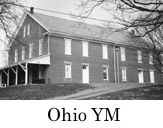The following is the entirety of the Memorial:
A Memorial Concerning Hannah H. Stratton, Deceased
Issued by New Garden Monthly Meeting of Friends held at Winona, Columbiana County, Ohio
4th Month, 21st Day, 1904
"The memory of the just is blessed."
We feel it a duty incumbent upon survivors, to give some account of the life and religious labors of our dear departed friend, Hannah H. Stratton, for the encouragement of others to persevere in the pathway of holiness, the end whereof is everlasting life.
In so doing it is not our desire to exalt the creature, but only to magnify that Grace which made her what she was, and that Power which sustained her through many deep baptisms and conflicts of spirit, and through which she was made instrumental in spreading the Redeemer's kingdom in various places, not only in our own Society, but among the poor and lowly of different classes.
The subject of this Memoir was born near Richland, Jefferson County, Ohio, and was the daughter of Joseph and Ruth Hobson, who were valuable Friends, the former filling the station of Elder for some years.
The family afterward moved to Flushing, Belmont County, Ohio, where she spent most of her youthful days. She left no record of her early religious experiences, but we have reason to believe that she was thoughtfully inclined from her youth, and through submission to the teachings of Divine Grace, and the cleansing operations thereof, she was prepared for the further manifestations of the will of her Heavenly Father concerning her.
In the spring of 1853, she was married to Barclay Stratton, who was a true helpmate and sympathizing companion in her various trials and exercise.
He was a man of sterling worth, of clear and sound judgment, a cheerful disposition, and was much beloved by those who knew him best. In the fall of 1864 he was drafted and taken to the army, where he bore his testimony unflinchingly to the inconsistency of war with the teachings of Christ, and was preserved through many trials of faith, refusing to drill, or do anything that would compromise his conscientious scruples against the unchristian practice.
Through the efforts of some members of the Meeting for Sufferings, he was released by order of the President, and was permitted to return to his beloved wife, who had keenly felt this trial, in addition to her religious exercises.
After having passed through many deep preparatory baptisms, Hannah H. Stratton appeared in the weighty work of the ministry, and, through faithful obedience to her Divine Lord and Master, though always much in the cross in this particular, she grew in her gift and was acknowledged a minister in the year 1869.
After having been for many years engaged in the work, she remarked to a younger Friend, "It don't get easy." In our religious meetings, the weightiness of her spirit and her humble, reverent waiting for the arising of Divine life were instructive, not daring to open her lips without feeling a renewed qualification and necessity laid upon her to stand forth in the work.
Thus, her ministry partook of the savor of life, and was sound and edifying, reaching to the witness for Truth in the hearts of those who heard her. As she advanced in years, and her religious experience deepened, particularly toward the close, her ministry became more deep and searching, often very close and plain, yet always accompanied with, and delivered in a spirit of love, even that which would gather all into the holy enclosure.
She was often engaged to speak of the uncertainty of life, and of the necessity of a preparation for death, and it was her chief concern to be found accepted and acquitted in the Divine sight, endeavoring to walk blamelessly before all, adorning the doctrine she delivered to others by a consistent life and conversation.
Humility was a conspicuous trait in her character, having a low estimate of her own attainments, and seldom alluding to any religious service she had performed, desiring to attribute all the praise to Him, who, when he puts forth his own, condescends to go before and prepare the way, and give strength and wisdom to perform what He requires; which was remarkably realized in her own experience during many long and trying journeys, undertaken only under a full and settled conviction that her peace consisted in making the sacrifice.
In 1872 a much beloved and only daughter was removed by death. Her mother thus alludes to this affecting event: "She, who was in the very bloom of youth, and her heart seasoned by Divine grace, occupied a conspicuous place in our little family circle, and was interwoven with all the future of my hopes and fears. But He who gave the treasure had a right to call it away, and it was all in wisdom, inscrutable wisdom, designed no doubt to loosen our affections from earth, and earthly treasure, and to teach us the solemn lesson that we, too, must die; that times and seasons are in the hands of Him who doeth according to his will, in heaven and in earth, and no man can stay his hand or say 'What doest Thou?'"
During this, and previous trials, the minds of the members of this Meeting were much drawn toward our beloved friend and her companion in near sympathy, illustrating the truth of the Scripture declaration, "Whether one member suffer, all the members suffer with it," and showing forth the blessed effects of that true Christian love and unity, which enables us to "Rejoice with them who do rejoice and to weep with them who weep."
For several years, Barclay and Hannah H. Stratton very acceptably filled the positions of Superintendent and Matron at Friends Boarding School, near Barnesville, Ohio, and it is believed that their influence and example were a blessing to the Institution.
She was an affectionate wife, and a tender mother, manifesting much solicitude for the best welfare of her family, and was concerned to bring them up in that simplicity which the Truth requires.
She was firmly attached to the ancient principles and testimonies of our religious Society, and was often engaged to encourage others to faithfulness in maintaining them. Having in early life submitted to the yoke and cross of Christ, she was qualified to show forth to others the blessed effects of obedience to Divine requiring, even "Righteousness and peace and joy in the Holy Ghost."
With the approbation of her Friends, she travelled much in the work of the Ministry, both in her own Yearly Meeting, and in several others on this continent, to the satisfaction of Friends among whom she labored, as was shown by returning Certificates with which she was furnished by them.
Previous to the performance of these religious visits, she was often prostrated by illness, during which she was made willing afresh to offer up her all on the altar of sacrifice. Her health being frail, and of a nervous temperament, she shrank from the avowal of her concern, but when the time came for its accomplishment, she was diligent in the prosecution of her religious duty, and very careful to not exceed the limitations of Truth.
Her mind was particularly drawn to African people, in sympathetic interest, and in Gospel love, and she frequently held meetings among them in the vicinity of Barnesville, Ohio, and elsewhere, to whom, it is believed, her services were very acceptable.
In the spirit, also, of Him who came "to seek and to save that which was lost," she felt her mind drawn toward the erring, and the unfortunate, and occasionally visited prisons and almshouses, where her fervent labors were felt to the tendering of many of the inmates.
On the 21st of Seventh month, 1892, her valuable and beloved husband, Barclay Stratton, was removed by death. In reference to his bereavement, she writes: "I feel so alone and dependent, now in my declining years, having lost that I so much needed in my various undertakings, and which has been spared to me these last thirty-nine years, but hope to be ever grateful for this great blessing, and to humbly and submissively bow to the will of Him who never errs." On the anniversary of this sad event she again writes: "My stay is yet, that he was permitted to enter a glorious immortality, and with thankfulness of heart, I hope ever to commemorate the goodness of Him who doeth all things well, and may we all know obedience to His requirings to keep pace with knowledge."
In the springs of 1895, with Certificates of unity from her Monthly, Quarterly, and Select Yearly Meetings, she embarked for Ireland, having for many years felt that a service would be required of her among those of our profession in the British Isles. Being somewhat advanced in life, it was no small trial to her to make this sacrifice. She was absent from home four months on this journey. There is reason to believe that she was instrumental in strengthening the hands of the sincere-hearted in that land. In allusion to her acceptable visit, an English Friend, in writing to a correspondent in this country, remarks: "Many were her baptisms and exercises and many her provings without and within, until the time came when she gave up to visit the seed in these Islands. He who looks on the heart knew her integrity, and has rewarded her according to the cleanness of her hands in His eyesight." The following memorandum was made soon after her return from this visit: "I feel to reverence and adore the power of Him who created a willingness in my heart to go forth in this great work and service, and who has, in His love and wisdom, prepared and strengthened for what He required; and how while taking a retrospective view of the labors of the last few months, my gracious Heavenly Father grants to his poor unworthy child sheaves of peace, that peace which he alone can give, which is an anchor to the soul which fadeth not away. Whilst I remember the superintending care of my Heavenly Father in many seasons of extremity, when in great mercy he has deigned to stand by me and cheer my almost hopeless soul, I can adopt the language, 'Bless the Lord, O my soul and all that is within me, bless His holy name.'"
During the winter of 1901-1902, our dear friend was prostrated on a bed of sickness, being confined to the house for many weeks, and it seemed doubtful for a time whether her stay her would be of long duration, during which time she had considerable to communicate to those around her, desiring that she might be ready when the summons came and that her work might be done. On the 3rd of Twelfth month, she said, "It is not sufficient to say alone that I see nothing in my way; but it is satisfying to feel an evidence of acceptance by Him who has condescended to own me, I can say that I feel that it would be a glorious boon to die. 'O Death, where is thy sting? O Grave, where is thy victory?'"
Twelfth month, 7th, she said she was very thankful that the great work was not to do now; that it was a great attainment to feel ready to be offered up without spot or wrinkle. "I do not say that I am ready, but I have felt great evidence of it; all through mercy, unmerited mercy." At another time, "I wished to have a soul-satisfying evidence of acceptance, and this I believe I have been able to do, yet the severing of body and spirit is a solemn thing."
At another time she said: "If I die now, it is with a blessed hope of a glorious immortality, all through the mercy and goodness of our God."
Her love for and interest in her friends was not abated even on a bed of sickness, but her mind was turned towards them, both in our own country and across the water, and a feeling of love and interest for all was expressed, and a concern for her own particular Meeting was manifest, where she had for so many years been a devoted and consistent member, laboring in the cause of her Divine lord and Master with that power and ability which He only can give. On the remark being made to hr that she might be spared to again go forth in her Master's service, she replied "she felt to leave all in His good hand, whether it be in life or death, desiring to feel a spirit of resignation to the Divine Will."
Shortly after this sickness she laid before her Monthly and Quarterly Meetings a concern she felt to visit in Gospel love some of those bearing our name in North Carolina, and also the African people in parts of the South. She visited families and schools and held meetings amongst them to the comforting of many hearts and the peace of her own mind.
Soon after returning the minute granted her for the foregoing religious service she penned the following: "I feel that, as I am nearing the setting sun of life, I may soon be released from this awfully responsible line of labor. Nevertheless, from time to time, while under the feeling that He only can give strength, notwithstanding my low estate, while I have gone forth in the service of the Master it has been my meat and drink to do His will, and under the clothing of His Divine Spirit my heart has been lifted up in grateful thanksgiving to feel though unworthy, through great mercy, I may be numbered among the very least of His servants, being oftimes prepared to adopt the language, 'Return unto thy rest, O my soul, for the Lord hath dealt bountifully with thee.'"
The last religious visit performed by our beloved friend was in the 8th and 9th months of 1903, to Hickory Grove Quarterly Meeting and some of its branches, and some meetings belonging to Iowa Yearly Meeting.
This journey was undertaken under much bodily weakness, but He who had hitherto strengthened her for the work assigned, did not fail her in this time of need, but enabled her to accomplish the service, much to the comfort and satisfaction of her friends, and to the peace of her own mind. In alluding to it afterward she said she felt entirely clear. After this her health began visibly to decline. Although very frail, she attended Yearly Meeting, and, on the 23rd of Tenth month, the funeral of Sara J. Cadwalader and spoke at the house. This was her last religious service.
During her illness of six weeks she was unable to converse too much, owing to the nature of her disease, but the quiet frame of her mind and the sweetness of her spirit made it a comfort to be in her room.
Her work seemed to be entirely done. Thus, with her lamp trimmed and her light burning, she appeared to have nothing to do but to quietly await the summons of her Lord.
It was evident that she had not followed cunningly devised fables, but the living, eternal Truth.
The last week of her life her decline was more rapid, and, on the 5th day of Twelfth month, soon after ten P.M., without sigh or struggle, she sweetly resigned her breath to Him who gave it, aged 77 years and 4 days.
We reverently trust she was permitted to join that innumerable company whom the Apostle John saw, and of whom it was declared, "These are they which came out of great tribulation and have washed their robes and made them white in the blood of the Lamb."
The interment was on the 8th, at ten A.M., after a large and favored meeting, wherein living testimonies were borne to her worth, and to the efficacy of that Grace which was her support throughout a lengthened life of dedication to the Master's service.
"Blessed are the dead which die in the Lord from henceforth; yea, sayeth the Spirit, that they may rest from their labors, and their works do follow them." |






